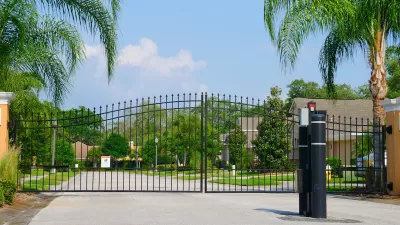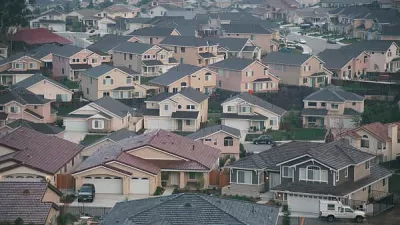Gated communities were once confined to specific neighborhoods or suburban areas, but as the global financial sector grows, entire cities are becoming gated enclaves where the 'one per cent' network and drive national policies, says Simon Kuper.
With the help of sociologist Saskia Sassen, Kuper traces the transformation of great global cities such as London, Paris, and New York from destitution four decades ago to their unprecedented desirability. "[F]rom the 1980s, these cities recovered. An increasingly complex financial sector needed more sophisticated networks of lawyers and accountants. Corporate mergers and takeovers meant global headquarters got concentrated in fewer places. Crime declined, making cities less scary. And so great cities grew richer. Fancy architects put up lovely buildings. House prices rose."
"First, the working classes and bohemians were priced out," he notes. "That was gentrification. Now comes plutocratisation: the middle classes and small companies are falling victim to class-cleansing. Global cities are becoming patrician ghettos."
"Global cities are turning into vast gated communities where the one per cent reproduces itself," argues Kuper. "Elite members don’t live there for their jobs. They work virtually anyway. Rather, global cities are where they network with each other, and put their kids through their country’s best schools."
FULL STORY: Priced out of Paris

Planetizen Federal Action Tracker
A weekly monitor of how Trump’s orders and actions are impacting planners and planning in America.

Congressman Proposes Bill to Rename DC Metro “Trump Train”
The Make Autorail Great Again Act would withhold federal funding to the system until the Washington Metropolitan Area Transit Authority (WMATA), rebrands as the Washington Metropolitan Authority for Greater Access (WMAGA).

The Simple Legislative Tool Transforming Vacant Downtowns
In California, Michigan and Georgia, an easy win is bringing dollars — and delight — back to city centers.

The States Losing Rural Delivery Rooms at an Alarming Pace
In some states, as few as 9% of rural hospitals still deliver babies. As a result, rising pre-term births, no adequate pre-term care and "harrowing" close calls are a growing reality.

The Small South Asian Republic Going all in on EVs
Thanks to one simple policy change less than five years ago, 65% of new cars in this Himalayan country are now electric.

DC Backpedals on Bike Lane Protection, Swaps Barriers for Paint
Citing aesthetic concerns, the city is removing the concrete barriers and flexposts that once separated Arizona Avenue cyclists from motor vehicles.
Urban Design for Planners 1: Software Tools
This six-course series explores essential urban design concepts using open source software and equips planners with the tools they need to participate fully in the urban design process.
Planning for Universal Design
Learn the tools for implementing Universal Design in planning regulations.
Smith Gee Studio
City of Charlotte
City of Camden Redevelopment Agency
City of Astoria
Transportation Research & Education Center (TREC) at Portland State University
US High Speed Rail Association
City of Camden Redevelopment Agency
Municipality of Princeton (NJ)





























